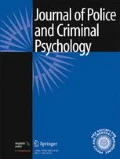Abstract
The potential influence of eyewitnesses’ metacognitions on identification decisions when confronted with a police lineup is largely unexplored. In two experiments, we investigated whether eyewitnesses’ pre-lineup memory strength inferences influenced the likelihood of their choosing from a lineup. In experiment 1, manipulating witnesses’ memory strength inferences, while holding memory encoding and retention conditions constant, increased positive identifications from culprit-absent lineups when witnesses inferred they had a poor memory for the culprit. In experiment 2, witnesses who had been interviewed and experienced difficult rather than easy recall of the culprit that was likely suggestive of a poor memory made more positive identifications from both culprit-absent and culprit-present lineups than those who experienced easy recall. Signal detection analyses supported a criterion shift account that proposes that witnesses who infer they have a relatively poor memory may demand less evidence for a positive identification than if they inferred a good memory. Thus, witnesses’ memory strength inferences may influence identification decisions independent of encoding conditions and lineup characteristics.
Similar content being viewed by others
Data Availability
Data are available at https://osf.io/d849n/.
References
Barr DJ, Levy R, Scheepers C, Tily HJ (2013) Random effects structure for confirmatory hypothesis testing: keep it maximal. J Mem Lang 68(3):255–278. https://doi.org/10.1016/j.jml.2012.11.001
Bates D, Mächler M, Bolker B, Walker S (2015) Fitting linear mixed-effects models using lme4. J Stat Softw 67(1), 1–48. https://doi.org/10.18637/jss.v067.i01
Brauer M, Curtin JJ (2018) Linear mixed-effects models and the analysis of nonindependent data: a unified framework to analyze categorical and continuous independent variables that vary within-subjects and/or within-items. Psychol Methods 23(3):389–411. https://doi.org/10.1037/met0000159
Feather NT (1966) Effects of prior success and failure on expectations of success and subsequent performance. J Pers Soc Psychol 3(3):287–298. https://doi.org/10.1037/h0022965
Főrster J, Strack F (1998) Subjective theories about encoding may influence recognition: Judgmental regulation in human memory. Soc Cogn 16(1):78–92. https://doi.org/10.1521/soco.1998.16.1.78
Green DM, Swets JA (1966) Signal detection theory and psychophysics. John Wiley
Groninger LD (1976) Predicting recognition during storage: the capacity of the memory system to evaluate itself. Bull Psychon Soc 7(5):425–428. https://doi.org/10.3758/BF03337236
Herrmann DJ (1982) Know thy memory: the use of questionnaires to assess and study memory. Psychol Bull 92(2):434–452. https://doi.org/10.1037/0033-2909.92.2.434
Hirshman E (1995) Decision processes in recognition memory: criterion shifts and the list-strength paradigm. J Exp Psychol Learn Mem Cogn 21(2):302–313. https://doi.org/10.1037/0278-7393.21.2.302
Klein SB, Loftus J, Fricker SS (1994) The effects of self-beliefs on repeated efforts to remember. Soc Cogn 12(4):249–261. https://doi.org/10.1521/soco.1994.12.4.249
Kovera MB, Evelo A (2021, online ahead of print). Eyewitness identification in its social context. J Appl Res Mem Cogn. https://doi.org/10.1016/j.jarmac.2021.04.003
Leippe MR, Eisenstadt D, Rauch SM (2009) Cueing confidence in eyewitness identifications: influence of biased lineup instructions and pre-identification memory feedback under varying lineup conditions. Law Hum Behav 33(3):194–212. https://doi.org/10.1007/s10979-008-9135-y
Leippe MR, Eisenstadt D, Rauch SM, Stambush MA (2006) Effects of social-comparative memory feedback on eyewitnesses’ identification confidence, suggestibility, and retrospective memory reports. Basic Appl Soc Psychol 28(3):201–220. https://doi.org/10.1207/s15324834basp2803_1
Lucas CA, Brewer N, Palmer MA (2021) Eyewitness identification: the complex issue of suspect-filler similarity. Psychol Public Policy Law 27(2), 151. https://doi.org/10.1037/law0000243
Morrell HER, Gaitan S, Wixted JT (2002) On the nature of the decision axis in signal-detection-based models of recognition memory. J Exp Psychol Learn Mem Cogn 28(6):1095–1110. https://doi.org/10.1037/0278-7393.28.6.1095
Palmer MA, Brewer N, Weber N (2010) Postidentification feedback affects subsequent eyewitness identification performance. J Exp Psychol Appl 16(4):387–398. https://doi.org/10.1037/a0021034
Quinlivan DS, Neuschatz JS, Cutler BL, Wells GL, McClung J, Harker DL (2012) Do pre-admonition suggestions moderate the effect of unbiased lineup instructions? Leg Criminol Psychol 17(1):165–176. https://doi.org/10.1348/135532510X533554
R Development Core Team. (2017). R: A Language and Environment for Statistical Computing. R Foundation for Statistical Computing.
Smith AM (2020) Why do mistaken identification rates increase when either witnessing or testing conditions get worse? J Appl Res Mem Cogn 9(4):495–507. https://doi.org/10.1016/j.jarmac.2020.08.002
Smith A, Wilford M, Quigley-McBride A, Wells GL (2019) Mistaken identification rates increase when either witnessing or testing conditions get worse. Law Hum Behav 43(4):358–368. https://doi.org/10.1037/lhb0000334
Wells GL, Kovera MB, Douglass AB, Brewer N, Meissner C, Wixted JT (2020) Policy and procedure recommendations for the collection and preservation of eyewitness identification evidence. Law Hum Behav 44(1):3–36. https://doi.org/10.1037/lhb0000359
Winkielman P, Schwarz N (2001) How pleasant was your childhood? Beliefs about memory shape inferences from experienced difficulty of recall. Psychol Sci 12(2):176–179. https://doi.org/10.1111/1467-9280.00330
Winkielman P, Schwarz N, Belli RF (1998) The role of ease of retrieval and attribution in memory judgments: Judging your memory as worse despite recalling more events. Psychol Sci 9(2):124–126. https://doi.org/10.1111/1467-9280.00022
Wright DB, London K (2009) Multilevel modelling: beyond the basic applications. Br J Math Stat Psychol 62(2):439–456. https://doi.org/10.1348/000711008X327632
Acknowledgements
We acknowledge valuable discussions with N. Weber and G. L. Wells on the operationalization of memory heuristics developed for a broader research program.
Funding
This research was assisted by honors and PhD student internal funding support. C. Lucas was supported by Australian Research Council Discovery Project DP150101905.
Author information
Authors and Affiliations
Corresponding author
Ethics declarations
Ethics Approval
All procedures performed in studies involving human participants were in accordance with the ethical standards of the institutional and/or national research committee and with the 1964 Helsinki declaration and its later amendments or comparable ethical standards. The studies and participant recruitment procedures were approved by the Social and Behavioral Science Ethics Committee of the authors’ institution.
Informed Consent
was obtained from all individual participants included in the study.
Conflict of Interest
The authors declare no competing interests.
Additional information
Publisher's Note
Springer Nature remains neutral with regard to jurisdictional claims in published maps and institutional affiliations.
Supplementary information
Below is the link to the electronic supplementary material.
Rights and permissions
About this article
Cite this article
Brewer, N., Zweck, T., Lucas, C. et al. Eyewitnesses’ Pre-lineup Memory Strength Inferences Can Influence Identification Decisions. J Police Crim Psych 37, 339–350 (2022). https://doi.org/10.1007/s11896-021-09462-x
Accepted:
Published:
Issue Date:
DOI: https://doi.org/10.1007/s11896-021-09462-x




